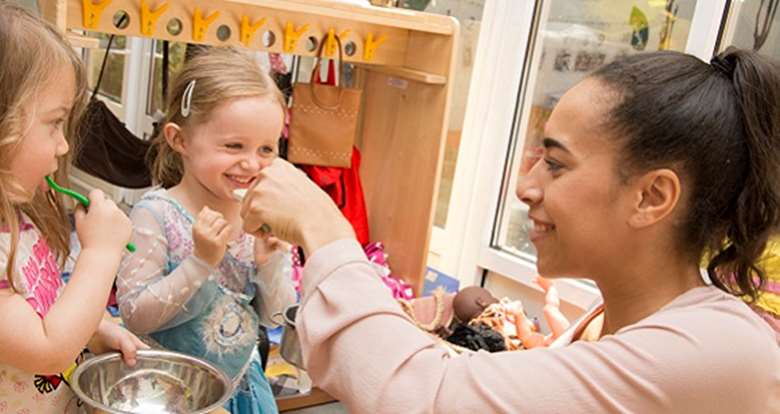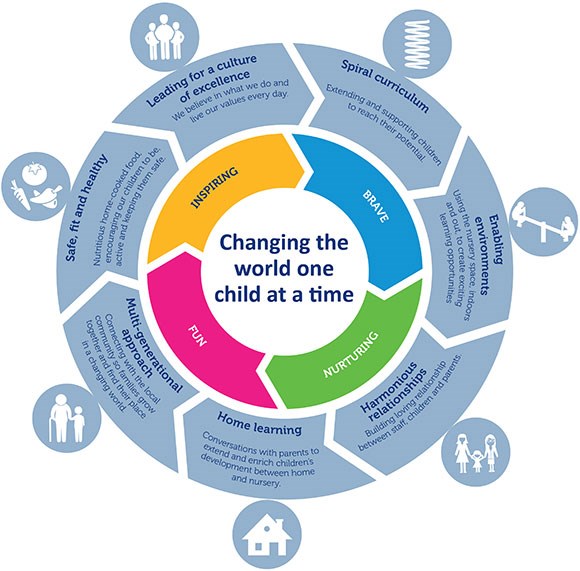London Early Years Foundation
Nursery World
Wednesday, May 2, 2018
'People stay at our nurseries because we always remember that we are here for the children'


What makes a childcare career at the London Early Years Foundation different? To find out we asked David Stevens, a room leader at the foundation’s Weir Link Nursery in Clapham, to tell us about why he has stayed with the organisation for 23 years.
You’ve been with the London Early Years Foundation (LEYF) for a long time. What makes it different from other nursery providers?
LEYF is unique because it is a social enterprise. Everything we do goes back into the community, including our profits. We have 37 nurseries now, but LEYF is not just another chain that is run for shareholders and all about the business. The children are at the heart of everything we do here. We also have our own unique early years curriculum.
What’s special about LEYF’s curriculum?
There are seven areas within our curriculum, such as home learning, a multigenerational approach and enabling environments. All these areas link together and are based on our own action research and the early education theorists like Rudolf Steiner, Jean Piaget and Lev Vygotsky. The core idea is that we follow the child’s lead. It’s about supporting child’s inquisitiveness not doing everything for them. So our activities are stimulating and make provocations – they provoke learning and questions from the children. An example would be if a child says, ‘I maded the robot,’ I would say, ‘Yes, I can see you did it, you made the robot – it’s huge’. We try to model rather than correct because we want to give children the opportunity to succeed rather than telling them.
How does home learning fit into this approach?
When we have pedagogical conversations with parents we don’t just tell parents what their child did that day. We say, ‘They had a good day because they’ve been exploring the mud kitchen and developed physical skills like pouring and scooping. They also learned the words gloopy and mucky’. Then, to bring in home learning, we might say, ‘If you’re out this weekend, could you use those words when they are jumping in muddy puddles?’ Statistics show that if parents bring what children learned at nursery into the home environment it can triple or quadruple the child’s learning experience. We recognise that parents are the primary educators and our role as a nursery is to support the development parents do with their children.
Why have you stayed at LEYF?
It’s the support I get from the LEYF and the staff throughout the organisation. They encourage me to do what I love, which is seeing the children develop. Another reason is the chief executive June O’Sullivan. She started as an operations manager and her vision is to change the world one child at a time. To do this LEYF needs quality staff and managers. People do genuinely stay here. I was at a meeting with LEYF room leaders recently and there were staff who had joined a couple of years ago but there were also many like myself who have been with the organisation for ten or more years. People stay at LEYF because we’re innovative, we’re excited and we do new things but we always remember that we are here for the children and their families.
Are there plenty of opportunities to develop your career?
There are plenty of opportunities to move up. I was a deputy within three years of joining and within five I was a manager. I chose to go back to be a practitioner five years ago as I wanted to spend more time working with the children, after more than a decade of management. LEYF supported me in doing that. With 37 nurseries there are plenty of opportunities for people to build a career here.

LEYF has a history of trying to encourage more men to work in childcare. What’s it like to be a male childcarer in LEYF?
When I joined there were only four men in the organisation and it was years before I worked with another man in the same nursery. Today we have a lot more male staff. We’re still a minority but it has increased because June is a big champion of men in childcare. We realise as an organisation that men bring a different perspective but always with the attitude that we want men who are quality practitioners – it’s not a case of we want a man because we haven’t got any. I’ve had a really positive experience here.
What keeps you motivated as a nursery worker?
It’s the children – seeing them develop is why I do this. One day we could have a future prime minister, Einstein or astronaut in our care and that’s part of why I work at LEYF. We mean it when we say we want to change the world one child at a time. I might tell parents that their children’s drawings are so creative they might be the next Picasso and, yes, we might laugh about that but it’s important to realise the potential in every child because, who knows they might well be the next Picasso.
THE LEYF PEDAGOGY AT A SNAP SHOT

Spiral curriculum – extending and supporting children to reach their potential
Harmonious relationships – building loving relationships between staff, children and parents
Home learning – working with parents to enrich development at home
Multigenerational approach – connecting children with their local communities
Enabling environments – using space to create exciting learning opportunities
Safe, fit and health – nutritious food, encouraging children to be active and safe




